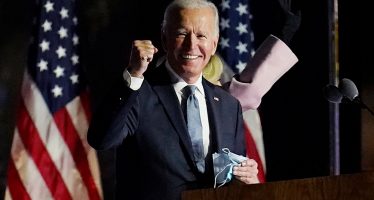Keep on Truckin’, urges Canada, but Protest Blockade evades an Easy Fix
 What do truckers and Covid-19 vaccinations have in common? You would think very little, but recent events in Ottawa prove otherwise.
What do truckers and Covid-19 vaccinations have in common? You would think very little, but recent events in Ottawa prove otherwise.
In January, Covid-19 mandates required drivers to be vaccinated before crossing the US-Canada border — sparking the Freedom Convoy action.
Protests generally have been on the rise over the past decade. A report from the Centre for Strategic and International Studies (CSIS), a non-profit research organisation, investigated the frequency of global rallies. It found between the years 2009 and 2019 there had been an 11.5 percent annual rise.
On the surface, that sounds like a good thing. When community and political problems are not addressed, the people have the right to voice their concerns. The battle to end police brutality or climate change comes from a different place than that to dispute an election result or drive a conservative agenda.
The Freedom Convoy began on January 22, with convoys of trucks leaving major provinces heading to the Canadian capital. They converged in Ottawa a week later, rallying at Parliament Hill. Spin-off protests have since blocked major roads leading to provincial capitals and crossings at the US-Canada border.
Ontario premier Doug Ford declared a state of emergency and implemented legal sanctions on those impeding the flow of trade routes. The protests have been condemned by the Canadian Trucking Alliance and Canadian Prime Minister Justin Trudeau, who called them “an insult to truth”.
Abacus Data, a think-tank based in Canada, conducted a poll and found two-thirds of respondents had “very little or nothing” in common with the protestors — and most found the rallies to be “offensive and inappropriate”.
Some of the world’s largest vehicle manufacturers — Ford, Toyota, Honda, and General Motors — have been forced to close plants as auto parts are held up in the chaos. Already suffering from a year of global supply shortages, the industry cannot afford additional setbacks.
The hospitality and retail sector around Ottawa has seen a massive drop in traffic and footfall. The protests are keeping people in their homes, and the lack of assurances from Ottawa officials is worrying many small business owners. The Rideau Centre, a popular shopping mall in downtown Ottawa, has been closed since Sunday February 6, impacting thousands of workers.
Sympathetic individuals in other countries have begun to join the cause as opposition to the covid mandate spreads to New Zealand and Australia. Truckers in the respective capitals of Wellington and Canberra have blocked roads surrounding parliamentary buildings.
How can this be resolved? As with most protests, once the initial outrage plays out and the public, media, and world-at-large move on, the protestors are likely to be left with diminishing momentum.
Ottawa will regain control of its streets — at some point — and protestors will disperse. The state of emergency increased the city’s daily budget to help fund additional security and find ways of removing the offending trucks. Smaller demonstrations which bloomed in other countries should die down with the demise of the original.
But all this points to a scary picture.
The protests are said to be propped-up by alt-right groups and conservatives warping the original intent. They have gathered support from right-wing media sources such as Fox News, as well as former US president Donald Trump. The interim leader of Canada’s conservative party, Candice Bergen, has lent her support to the protestors. They “deserve to be heard and they deserve respect”, she says. But many say that the dispute has been hijacked by far-right activists, often with no connection to the trucking industry.
Some of these newcomers have brought xenophobic and racist tensions to the fray, using propaganda tied to the Q-Anon group. This changing rhetoric has galvanised some global far-right sympathisers who raised $8m in support on the GoFundMe platform.
This will end, in due course — but the narrative surrounding the issue may affect politics for years to come.
By Yogesh Patel
You may have an interest in also reading…
The First Days: The Need for Speed in US Politics
In his inauguration speech, President Joe Biden called US democracy precious and fragile: “And at this hour, my friends, democracy
No Gloating on First Anniversary of DC Riots: Misguided Republican Anger at a Beneficial Electoral System
She called it a “beautiful sight to behold” when student protesters stormed the building that houses the Hong Kong Legislative
Bonds: Name of the Game for Cool (and Resilient) Operators
US corporate bonds certainly lack the thrill of that other famous Bond, James. But when it comes to strength and
















































































